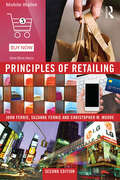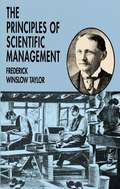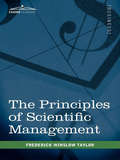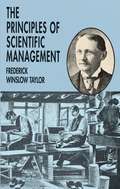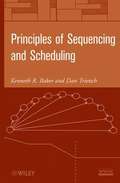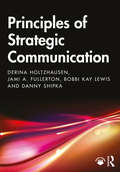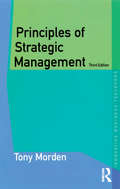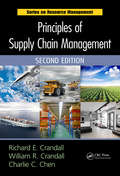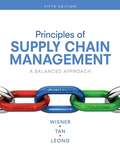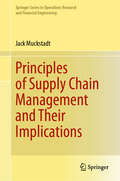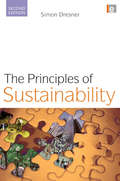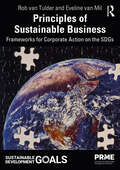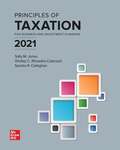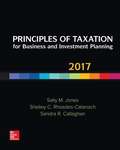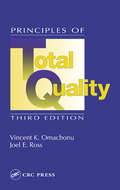- Table View
- List View
Principles Of Responsible Management: Glocal Sustainability, Responsibility, And Ethics
by Roger Conaway Oliver LaaschPRINCIPLES OF RESPONSIBLE MANAGEMENT offers an international, scientifically sound, and strictly practice-related perspective. It is the first official textbook of the United Nations for the Principles for Responsible Management Education (PRME) academic network, and a reference book for companies of the United Nations Global Compact Initiative. It is a primary text for traditional business and society, business ethics, corporate social responsibility, and sustainability courses, or may serve as a practitioner handbook. Contributors are renowned academic professionals in their respective chapter topics as well as distinguished business practitioners who contribute highly relevant practice cases.
Principles of Retailing
by John Fernie Suzanne Fernie Christopher MooreRetailing is one of the biggest and most important sectors in today's economy. Graduates who are seeking a career in the sector will therefore require a solid knowledge of its core principles. The Principles of Retailing Second Edition is a topical, engaging and authoritative update of a hugely successful textbook by three leading experts in retail management designed to be a digestible introduction to retailing for management and marketing students. The previous edition was praised for the quality of its coverage, the clarity of its style and the strength of its sections on operation and supply chain issues such as buying and logistics, which are often neglected by other texts. This new edition has been comprehensively reworked in response to the rapid changes to the industry, including the growth of online retail and the subsequent decline of physical retail space and new technologies that improve customer experience and help track consumer behaviour. It also builds upon the authors' research over the last decade with new chapters on offshore sourcing and CSR and product management in addition to considerable revisions to existing chapters to highlight changes in online retailing and e-tail logistics, retail branding, retail security, internationalisation and the fashion supply chain. This edition will also be supported by a collection of online teaching materials to help tutors spend less time preparing and more time teaching.
The Principles of Scientific Management
by Frederick Winslow TaylorThe basis of modern organization and decision theory, this influential essay has motivated administrators and students of managerial technique for more than 80 years. The author discusses eliminating inefficiency through a system based on principles applicable to individual and collective activities. A ground-breaking, and still-inspiring work.
The Principles of Scientific Management
by Frederick Winslow TaylorIt seems, at first glance, like an obvious step to take to improve industrial productivity: one should simply watch workers at work in order to learn how they actually do their jobs. But American engineer FREDERICK WINSLOW TAYLOR (1856-1915) broke new ground with this 1919 essay, in which he applied the rigors of scientific observation to such labor as shoveling and bricklayer in order to streamline their work... and bring a sense of logic and practicality to the management of that work. This highly influential book, must-reading for anyone seeking to understand modern management practices, puts lie to such misconceptions that making industrial processes more efficient increases unemployment and that shorter workdays decrease productivity. And it laid the foundations for the discipline of management to be studied, taught, and applied with methodical precision.
The Principles of Scientific Management
by Frederick Winslow TaylorFor more than 80 years, this influential work by Frederick Winslow Taylor -- the pioneer of scientific management studies -- has inspired administrators and students of managerial techniques to adopt productivity-increasing procedures. Indeed, this book laid the groundwork for modern organization and decision theory.As an engineer for a steel company, Taylor made careful experiments to determine the best way of performing each operation and the amount of time it required, analyzing the materials, tools, and work sequence, and establishing a clear division of labor between management and workers. His experiments resulted in the formulation of the principles expounded in this remarkable essay, first published in 1911.Taylor advocated a scientific management system that develops leaders by organizing workers for efficient cooperation, rather than curtailing inefficiency by searching for exceptional leaders someone else has trained. The whole system rests upon a foundation of clearly defined laws and rules. Moreover, the fundamental principles of scientific management apply to all kinds of human activities, from the simplest individual acts to the most elaborate cooperative efforts of mighty corporations. Correct application of these principles, according to Taylor, will yield truly astonishing results.
Principles of Security and Crime Prevention
by Clifford W. Van Meter Truett A. Ricks Pamela A. CollinsThis introductory text provides a thorough overview of the private security system. This edition includes crime prevention and its zones of protection - the theoretical framework that provides the bridge between private and public sector law enforcement. From the historical development and the professional nature of security and crime prevention to the legal aspects of private security, this well-rounded text covers basic elements of security and crime prevention.
Principles of Sequencing and Scheduling (Wiley Series in Operations Research and Management Science)
by Kenneth R. Baker Dan TrietschAn updated edition of the text that explores the core topics in scheduling theory The second edition of Principles of Sequencing and Scheduling has been revised and updated to provide comprehensive coverage of sequencing and scheduling topics as well as emerging developments in the field. The text offers balanced coverage of deterministic models and stochastic models and includes new developments in safe scheduling and project scheduling, including coverage of project analytics. These new topics help bridge the gap between classical scheduling and actual practice. The authors—noted experts in the field—present a coherent and detailed introduction to the basic models, problems, and methods of scheduling theory. This book offers an introduction and overview of sequencing and scheduling and covers such topics as single-machine and multi-machine models, deterministic and stochastic problem formulations, optimization and heuristic solution approaches, and generic and specialized software methods. This new edition adds coverage on topics of recent interest in shop scheduling and project scheduling. This important resource: Offers comprehensive coverage of deterministic models as well as recent approaches and developments for stochastic models Emphasizes the application of generic optimization software to basic sequencing problems and the use of spreadsheet-based optimization methods Includes updated coverage on safe scheduling, lognormal modeling, and job selection Provides basic coverage of robust scheduling as contrasted with safe scheduling Adds a new chapter on project analytics, which supports the PERT21 framework for project scheduling in a stochastic environment. Extends the coverage of PERT 21 to include hierarchical scheduling Provides end-of-chapter references and access to advanced Research Notes, to aid readers in the further exploration of advanced topics Written for upper-undergraduate and graduate level courses covering such topics as scheduling theory and applications, project scheduling, and operations scheduling, the second edition of Principles of Sequencing and Scheduling is a resource that covers scheduling techniques and contains the most current research and emerging topics.
Principles of Sequencing and Scheduling
by Kenneth R. Baker Dan TrietschAn up-to-date and comprehensive treatment of the fundamentals of scheduling theory, including recent advances and state-of-the-art topicsPrinciples of Sequencing and Scheduling strikes a unique balance between theory and practice, providing an accessible introduction to the concepts, methods, and results of scheduling theory and its core topics. With real-world examples and up-to-date modeling techniques, the book equips readers with the basic knowledge needed for understanding scheduling theory and delving into its applications. The authors begin with an introduction and overview of sequencing and scheduling, including single-machine sequencing, optimization and heuristic solution methods, and models with earliness and tardiness penalties. The most current material on stochastic scheduling, including correct scheduling of safety time and the use of simulation for optimization, is then presented and integrated with deterministic models. Additional topical coverage includes:Extensions of the basic modelParallel-machine modelsFlow shop schedulingScheduling groups of jobsThe job shop problemSimulation models for the dynamic job shopNetwork methods for project schedulingResource-constrained project schedulingStochastic and safe schedulingExtensive end-of-chapter exercises are provided, some of which are spreadsheet-oriented, and link scheduling theory to the most popular analytic platform among today's students and practitioners--the Microsoft Office Excel® spreadsheet. Extensive references direct readers to additional literature, and the book's related Web site houses material that reinforces the book's concepts, including research notes, data sets, and examples from the text.Principles of Sequencing and Scheduling is an excellent book for courses on sequencing and scheduling at the upper-undergraduate and graduate levels. It is also a valuable reference for researchers and practitioners in the fields of statistics, computer science, operations research, and engineering.
Principles of Solar Gas Turbines for Electricity Generation (Green Energy and Technology)
by Amos MadhlopaThis is the first book dedicated to solar gas turbines, providing fundamental knowledge and state-of-the-art developments in the field. A gas turbine is a heat engine in which a mixture of fuel and air is burned in a chamber that is an integral part of the flow circuit of the working fluid. The burnt gas mixture expands and turns the turbine, which can be connected to a generator for electricity production. Solar gas turbines offer an important alternative to conventional gas turbines driven by non-renewable, polluting fossil fuels such as diesel or natural gas. The book provides a comprehensive overview of the topic as well as numerous illustrations.
Principles of Strategic Communication
by Derina Holtzhausen Jami Fullerton Bobbi Kay Lewis Danny ShipkaDesigned to support the paradigm shift in media and communication, this book presents the basic tenets of strategic communication and its foundational disciplines of advertising, public relations, and marketing communications. Drawing on the latest research in the field, the text introduces students to the theories of strategic communication while at the same time outlining how to apply them to everyday practice. To facilitate learning and tie concepts to practice, each chapter includes introductory focus questions, a contemporary global case study, a career profile of a current practitioner, end-of-chapter discussion questions, and features that highlight how research methods can be applied to strategic communication practice. Principles of Strategic Communication is ideal as a core text for undergraduate students in strategic communication courses within media, communication, marketing, and advertising programs. The accompanying online support material features chapter summaries, useful links to examples of strategic communication in action, suggested further reading, and practice test questions. Instructors will find an instructor’s resource manual that includes sample syllabi, class activities, lecture topics, and a test bank.
Principles of Strategic Management (Innovative Business Textbooks)
by Tony MordenNow published in its Third Edition, Principles of Strategic Management by Tony Morden is a proven textbook that offers a comprehensive introduction to the study and practice of strategic management. This new edition covers the fundamentals of strategic analysis and planning, strategy formulation, strategic choice, and strategy implementation. It contains new material on leadership and corporate governance, and on the strategic management of time, risk, and performance. There is a new chapter on the key issue of crisis and business continuity management. The book retains the strong international flavour of its predecessors. The book is constructed in sharply focused Parts and Chapters. The text is then broken down into accessible Sections. The presentation is clear and reader-friendly. Principles of Strategic Management is ideal for use on undergraduate, conversion masters, and MBA courses in business and management. Its reader-friendly approach also makes it suitable for block-release type courses, distance-learning programmes, self-directed study, in-company training, and continuing personal professional development.
The Principles of Successful Freelancing: Control Your Destiny - Become a Successful Freelancer Today!
by Miles BurkeThinking about becoming your own boss and embarking on the wonderful and rewarding journey of freelancing? The Principles of Successful Freelancing is for you. In this easy-to follow guide you'll learn what's important in transforming your skills into a booming freelance business.This book leads you through the entire process, from getting started, through to winning and keeping loyal clients. Running a successful freelance business is easy, and with the information in this book, you'll confidently turn your freelancing dream into a profitable reality. Learn how to make a smooth transition into freelancing Understand how to effectively manage your money Ensure you spend your time on the right activities Discover why a work/life balance is important Learn how your network can support you and your business Overcome your fear of sellingAnd much more ...The 12 Principles Of Successful Freelancing Get OrganizedKeep your workspace tidy and plan ahead(short- and long-term).Control StressRemain calm and work through issues to avoid early burnout..ResearchSpend quality time researching your proposed business-it's more than a five minute web surf.Be PassionateLove your work! You should enjoy what you do for a living.BudgetSave for a rainy day rather than spend every centas it comes in.Value your HealthBad health stops you from working. Take time to exercise and maintain a nutritious diet.Embrace SellingEnjoy the sales challenge-it's easier than you think!Satisfy CustomersDon't do average work-exceed their expectations and make them need you.Grow Your NetworkValue family and friends' support, and meet new people all the time.Maintain CashflowIt's what is in the bank that counts, not what you are billing-understand the difference.Continually LearnKeep acquiring new skills and knowledge, every week. Let it slip and you could be left behind.Achieve a Work/Life BalanceYour life should be more than work-maintain a good balance for health and success.
The Principles of Successful Freelancing
by Miles BurkeThinking about becoming your own boss and embarking on the wonderful and rewarding journey of freelancing? The Principles of Successful Freelancing is for you. In this easy-to follow guide you'll learn what's important in transforming your skills into a booming freelance business. This book leads you through the entire process, from getting started, through to winning and keeping loyal clients. Running a successful freelance business is easy, and with the information in this book, you'll confidently turn your freelancing dream into a profitable reality. Learn how to make a smooth transition into freelancing Understand how to effectively manage your money Ensure you spend your time on the right activities Discover why a work/life balance is important Learn how your network can support you and your business Overcome your fear of selling And much more . . . The 12 Principles Of Successful Freelancing Get Organized Keep your workspace tidy and plan ahead(short- and long-term). Control Stress Remain calm and work through issues to avoid early burnout. . Research Spend quality time researching your proposed business-it's more than a five minute web surf. Be Passionate Love your work! You should enjoy what you do for a living. Budget Save for a rainy day rather than spend every cent as it comes in. Value your Health Bad health stops you from working. Take time to exercise and maintain a nutritious diet. Embrace Selling Enjoy the sales challenge-it's easier than you think! Satisfy Customers Don't do average work-exceed their expectations and make them need you. Grow Your Network Value family and friends' support, and meet new people all the time. Maintain Cashflow. It's what is in the bank that counts, not what you are billing-understand the difference. Continually Learn Keep acquiring new skills and knowledge, every week. Let it slip and you could be left behind. Achieve a Work/Life Balance Your life should be more than work-maintain a good balance for health and success.
Principles of Supply Chain Management (Resource Management)
by Richard E. Crandall William R. Crandall Charlie C. ChenThe second edition of this popular textbook presents a balanced overview of the principles of supply chain management. Going beyond the usual supply chain text, Principles of Supply Chain Management not only details the individual components of the supply chain, but also illustrates how the pieces must come together. To show the logic behind why su
Principles of Supply Chain Management: A Balanced Approach
by Keah-Choon Tan G. Keong Leong Joel WisnerThis book helps you examine the latest practices, trends, and emerging developments and guides you step-by-step through the management of all supply chain activity. You review issues related to both domestic and global supply chains as comprehensive, one-of-a-kind coverage encompasses important processes in operations, purchasing, logistics, as well as process integration. A balanced approach follows the natural flow through the supply chain. Well-organized chapters demonstrate the practical applications of supply chain management in today's workplace with the help of intriguing SCM Profiles and interesting real business examples. Relevant end-of-chapter questions, problems, and new cases help you put what you learn into practice as you sharpen your management skills.
Principles of Supply Chain Management and Their Implications (Springer Series in Operations Research and Financial Engineering)
by Jack MuckstadtThe text begins with a discussion of the basic principles of supply chain management and some attributes of certain industries. The remainder of the text is devoted to developing and applying mathematical concepts needed to address the many issues associated with managing supply chains and, in particular, uncertainty, in a variety of real world settings. In particular, the final chapter is devoted to the design and operation of a vaccine distribution system during a pandemic along with a critique of the way the system used in the United States performed.
The Principles of Sustainability
by Simon DresnerAt a time of increasingly rapid environmental deterioration and climate change, sustainability is one of the most important issues facing the world. Can we create a sustainable society? What would that mean? How should we set about doing it? How can we bring about such a profound change in the way things are organized? This text tackles these questions directly. It covers: historical development of the concept of sustainability; contemporary debates about how to achieve it; and obstacles and the prospects for overcoming them. This new fully revised edition covers the latest on the climate change front, particularly the advances in scientific understanding and political awareness of climate change. Other updates include more recent economic analyses, particularly the Stern Report, and the global shift away from faith in markets over the past five years.
Principles of Sustainable Business: Frameworks for Corporate Action on the SDGs (The Principles for Responsible Management Education Series)
by Rob van Tulder Eveline van MilThe basic function of companies is to add value to society. Profits are a means to an end, not an end in itself. The ability of companies to innovate, scale and invest provides them with a powerful base for positive change. But companies are also criticized for not contributing sufficiently to society’s grand challenges. An increasingly VUCA (Volatile, Uncertain, Complex and Ambiguous) world creates serious governance gaps that not only require new ways of regulation, but also new ways of doing business. Can companies effectively contribute to sustainable development and confront society’s systemic challenges? Arguably the most important frame to drive this ambition was introduced and unanimously adopted in 2015: the Sustainable Development Goals (SDGs). The SDG-agenda not only defines a holistic set of global goals and targets, but also foundational principles to guide meaningful action to their achievement by 2030. Multinational companies have signed up to the SDGs as the world’s long-term business plan. Realizing the SDGs provides a yearly $12 trillion investment and growth opportunity, while creating hundreds of millions of jobs in the process. But progress is too slow – witnessing society’s inability to deal with pressing human, ecological, economic and health crises – whilst the vast potential for societal value creation remains underutilized. This book provides a timely account of the systemic, strategic and operational challenges that need to be addressed to enhance the effectiveness of corporate involvement in society, by using the SDGs as the leading principles-based framework for actionable, powerful and transformative change. Principles of Sustainable Business is written for graduate and postgraduate (executive) students, policymakers and business professionals who want to understand the complex challenges of global sustainability. It shows how companies can design and implement SDG-relevant strategies at three levels: the macro level, to assess whether the SDGs present wicked problems or opportunities; the micro level, to develop and operationalize innovative business models, design new business cases and navigate organizational transition trajectories; and the meso level, to develop fit-for-purpose cross-sector partnering strategies. Principles of Sustainable Business presents innovative tools embedded in a coherent sequence of analytical frameworks that can be applied in courses for students, be put into practice by business professionals and used by action researchers to help companies contribute to the Decade of Action.
Principles Of Taxation For Business And Investment Planning
by Sandra R. Callaghan Shelley C. Rhoades-Catanach Sally JonesPrinciples of Taxation for Business and Investment Planning focuses on the role taxes play in business and investment decision, presenting the general roles of taxation and discussing its implications for all tax-paying entities before delving into a specific exception. The benefit of this approach is a strong grasp of the fundamental principles informing taxation rules: students comprehend the framework of the tax system, making future changes to the tax code easier to understand-no matter how many there are. <p><p> Unlike traditional introductory titles, Principles of Taxation for Business and Investment Planning downplays the technical detail that makes the study of Taxation convoluted and off-putting for business students. This title shows students that an understanding of Taxation is not only relevant, but critical to their success in the business world. Don't just teach your students the tax code; teach them how the tax code affects business decision making with the current edition!
Principles of Taxation for Business and Investment Planning
by Sally M. Jones Shelley C. Rhoades-CatanachPrinciples of Taxation for Business and Investment Planning focuses on the role taxes play in business and investment decisions, presenting the general roles of taxation and discussing its implications for all tax-paying entities before delving into a specific exception. The benefit of this approach is a strong grasp of the fundamental principles informing taxation rules: students comprehend the framework of the tax system, making future changes to the tax code easier to understand-no matter how many there are.
Principles of Taxation for Business and Investment Planning (2017 Edition)
by Shelley Rhoades-Catanach Sally M. JonesPrinciples of Taxation for Business and Investment Planning focuses on the role taxes play in business and investment decision, presenting the general roles of taxation and discussing its implications for all tax-paying entities before delving into a specific exception. The benefit of this approach is a strong grasp of the fundamental principles informing taxation rules. This helps students comprehend the framework of the tax system, making future changes to the tax code easier to understand-no matter how many there are. Unlike traditional introductory texts, Principles of Taxation for Business and Investment Planning downplays the technical detail that makes the study of taxation such a nightmare for business students. This text attempts to convince students that an understanding of taxation is not only relevant but critical to their success in the business world. Don't just teach your students the tax code; teach them how the tax code affects business decision making with the 2017 edition!
Principles of Taxation in the United States: Theory, Policy, and Practice
by Fabio AmbrosioTaxation is a discipline that does not receive sufficient academic attention. It is typically viewed as a subset of law, accounting, public policy, economics, or finance. In this respect, most academic efforts in the field of taxation are shadowed by a mother discipline. There is currently an unprecedented need to approach tax pedagogy in a way that is independent of another discipline. This book caters to that real and unmet need in tax pedagogy. One of the book’s advantages is that it is not tied to a specific tax year and does not coddle the reader with volumes of time-sensitive information. In this book the tax year is never the focus, as the center stage is reserved for teaching the principles and skills necessary to independently find answers. The reader will learn to appreciate the complexity of the American tax system and will be endowed with the contextual understanding necessary to formulate educated opinions about how taxes work and, most importantly, why. Contrary to common belief, taxation in the United States has remained fairly stable for the last 100 years. This book uses the federal individual income tax as a vehicle to unveil the mechanics that make up the American tax system. This book is essential reading for students taking a first course in taxation, at the undergraduate or graduate level, as part of programs in accounting, law, public administration, or business at large.
Principles of the Carriage of Goods by Sea
by Paul ToddPrinciples of the Carriage of Goods by Sea offers students studying this topic as part of their LLM or LLB course an accessible, comprehensive overview of the subject from a leading expert in the field. Written specifically with students in mind, concentrating on principles, and tailored to common law coverage, this title presents all the essential topics and is supported by the following useful pedagogy: Line Diagrams: illustrating the relationships between parties so that this may be understood at a glance; also where appropriate, time lines Case Studies: looking at topical matters such as piracy, and problematic areas of law such as reachable on arrival clauses and the carriage of bulk oil by sea Sample Problem Questions: problem questions and suggestions to help students to prepare for assessment Annotated appendices: concise appendix of the most important legislation and international conventions, with useful annotation from the author that explains these and puts them in context
Principles of Total Quality
by Vincent K. Omachonu Joel E. RossIn this era of global competition, the demands of customers are growing, and the quest for quality has never been more urgent. Quality has evolved from a concept into a strategy for long-term viability. The third edition of Principles of Total Quality explains this strategy for both the service and manufacturing sectors.This edition addr
Principles of Value-Based Competition: Redefining Health Care
by Michael E. Porter Elizabeth Olmsted TeisbergThe zero-sum competition of the 1990s and early 2000s in the U.S. health care system has clearly failed. It did not produce widespread improvements in the quality and cost of delivering care, nor widen access to care for all Americans. Instead, zero-sum competition perpetuated inefficiency and substandard quality. Health care competition must be transformed to a value-based competition on results. This is the best way, and the only way, to drive sustained improvements in quality and efficiency. The experience in numerous other industries tells us that this transformation is possible. But what would value-based competition in health care look like?

